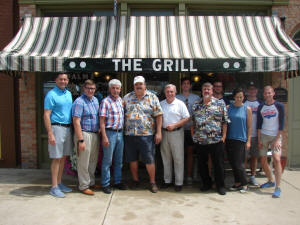
This group
photo from Tuesday’s NTHP stop in Atlanta and Lincoln is a
testament to how seriously tourism experts take the lure of
Route 66 and the economic impact it has for our communities.
In the group are a local Atlanta tourism leader, two
Illinois tourism directors dedicated to promoting Route 66,
two museum directors in Logan County, the Illinois State
Representative for Logan County, a representative for the
local member of Congress, members of the National Trust for
Historic Preservation, and two members of The National
Geographic Society. They get it! |
Communities
embracing Route 66 ‘The Mother Road’ offer tourists quirky fun and
receive back
 Send a link to a friend
Send a link to a friend
[July 07, 2018]
One of the most
important tourist destinations in Logan County, the most frequented,
isn’t a building or a statute or a museum. It is the road itself
that brings the tourists, the most famous highway in the world,
Route 66. The Mother Road holds untold potential that deserves
preserving. That is the conclusion of local, state and national
tourism and government officials.
|
|
 From Chicago to Los Angeles, in towns through which
Route 66 runs, communities are marketing themselves as Route 66
destinations. From Chicago to Los Angeles, in towns through which
Route 66 runs, communities are marketing themselves as Route 66
destinations.
Pontiac, Illinois is a prime example of this enlightened attitude,
reinventing itself from a dot on the map bypassed by Interstate 55,
now transformed into a vibrant tourist destination on Route 66.
But Route 66 is in trouble. The National Trust for Historic
Preservation (NTHP) has placed the highway on their list of the
eleven most endangered tourist attractions in the country.
Along the route the remnants of the road are falling apart, bridges
are in disrepair, motels and restaurants that were famous as Route
66 attractions from its beginnings in the 1920’s are disappearing.
Some federal grants have been available through the National Park
Service Route 66 Corridor Preservation Program, but that source is
due to sunset next year. Time is running out for some of the most
endangered sites along the highway, sites key to tourism success and
a legacy for all Americans.
Toward that end, the National Trust for Historic Preservation is
lobbying Congress to declare Route 66 a National Historic Trail.
This would make it eligible for federal funding.

The House of Representative has passed HR801 unanimously to make the
designation official and has sent the bill to the Senate for a vote
and then onto the President’s desk for his signature. Congressman
Darin LaHood was one of the sponsors of the bill.
To help this push for federal help, the NTHP has begun an odyssey
along the length of Route 66 to bring as much attention as possible
to the importance of this legislation. The NTHP road trip pulled
into Logan County Thursday afternoon with a first stop in Atlanta, a
town that recognizes its Route 66 ties and tourism potential. They
were greeted by Atlanta tourism advocate Bill Thomas and Illinois
House Representative Tim Butler, along with Bill Kelly and Geoff
Ladd from Route 66 Scenic Byways.
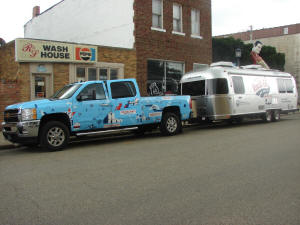
The National Trust for Historic
Preservation (NTHP) rolls into Atlanta on a mission to save The
Mother Road, and its historic significance to the country.
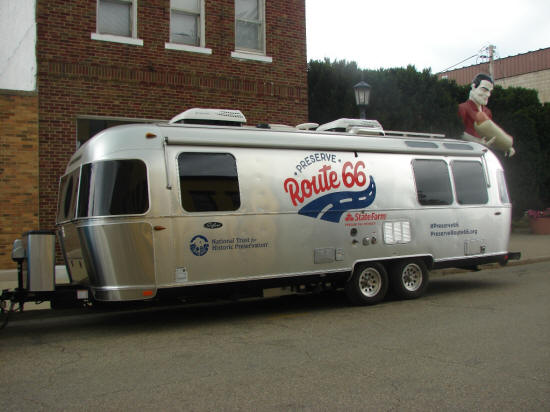
The NTHP is driving
the entire length of Route 66 towing an Airstream trailer. Airstream
is one of the most historically significant companies that allowed
Americans to exercise their wanderlust along Route 66 in relative
comfort.
Along with the NTHP personnel traveling in an
Airstream trailer to the Santa Monica pier are reporters for the
National Geographic Society. They are taking photos and live
streaming the trip, getting the word out to the nation about Route
66.
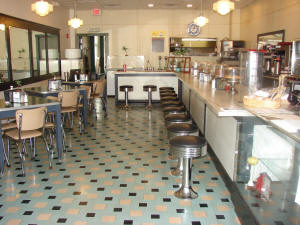
The unique Palms
Grill on Route 66 in Atlanta awaits another busy day serving locals
and tourists from all over the world. It is a true treasure for the
Atlanta economy.
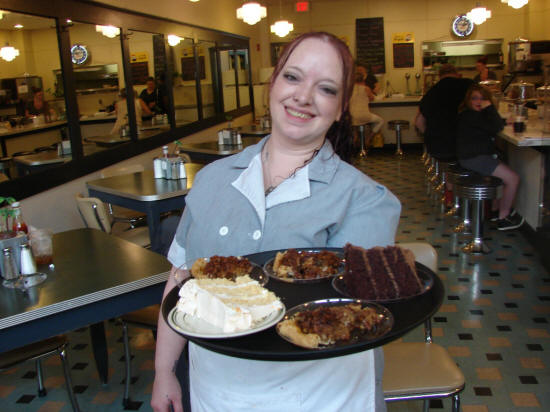
The Route 66
experience is not just about places, but the wonderful people
travelers meet along the way. Sarah at the Palms Grill is another
treasure to her community.
The Route 66 pathfinders visited the Palms Grill and
checked out the Paul Bunyon statute.
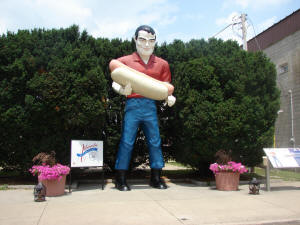
Atlanta’s Paul Bunyon
is another quirky attraction along Route 66. Quirky is good and has
proven to draw carloads of tourists. They always get out of their
seats to explore other downtown attractions.
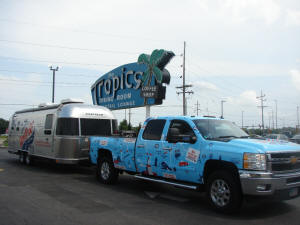
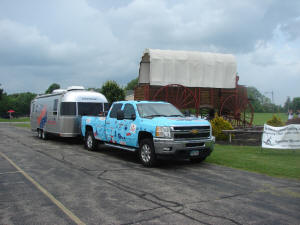
The NTHP Airstream and the World’s Largest Covered Wagon.
[to top of second column] |

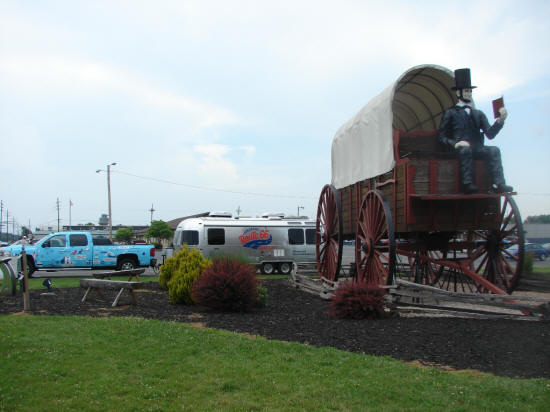
An old covered wagon
meets with a new covered wagon.
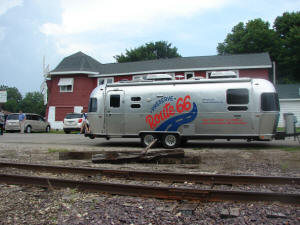
The trip through
Lincoln ended on Route 66 at The Mill Museum.
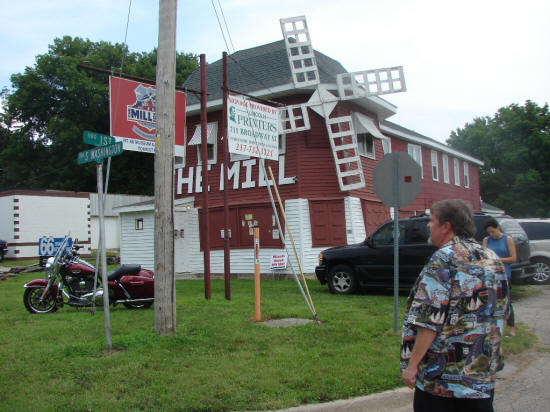
Geoff Ladd, the
driving force behind the restoration of The Mill, gives a personal
tour to the travelers with the National Trust for Historic
Preservation of the wonderful place right on Route 66.
Then it was on to Lincoln for stops at the new
Tropics sign, the World’s Largest Covered Wagon steered by Abraham
Lincoln and a final stop at the Mill Museum.
“Quirky sites along Route 66 draw tourists,” said Bill Kelly
director of the Route 66 Scenic Byway organization in Springfield. “These sites
from years-gone-by get people out of their cars, and we hope they will want to
explore other venues nearby,” he added.
He pointed out that there are 400 drivable miles of Route 66 in Illinois with
the potential to draw people from all over the world.
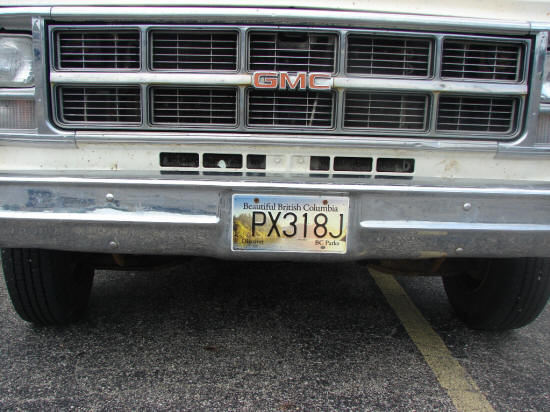
Evidence that President Abraham Lincoln can draw
tourists from all over. These folks are visiting the World’s Largest Covered
Wagon with the President at its reins.
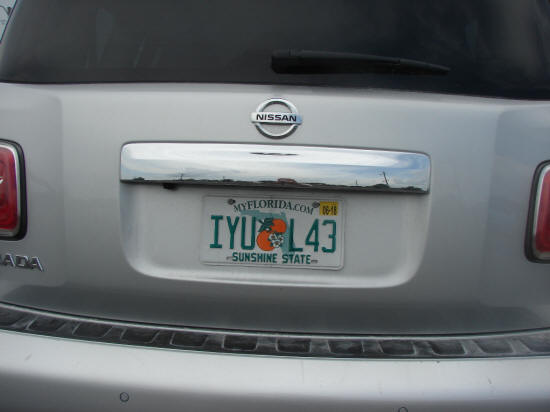
Yes, tourists come from all over. Lincoln is the
confluence of Route 66 and Abraham Lincoln, the two draws in Illinois that are
most popular outside Chicago.
Route 66 and Abraham Lincoln are the two most popular tourist draws in Illinois.
In that vein, Logan County is afforded double opportunities supported by two
National Heritage Areas designations - Route 66 and Looking for Lincoln.
Tourism brings in dollars and jobs for local businesses.
In order to successfully market a community’s ties to Route 66 it is vital to
understand what it is about a highway from the early part of the 20th century
that so resonates with people, even people from different cultures.
Bill Kelly has some thoughts on that. “For one, Route 66 harkens back to a
simpler time in America, and that is a great attraction to people. Even visitors
from overseas are aware of what America was like in the 1940’s and 1950’s, post
World War II.
“Route 66 offers a menu of activities and sites that draw people in, letting
them design their own experience. It has thousands of miles of travel with no
borders, something that is amazing in a world of small countries and continuous
borders. It is anchored by two of the largest cities in the country but in
between anything is possible.

“People can choose their own unique experience. And just a few blocks off Main
Street America are some of the most interesting experiences people can have.
Communities need to discover their exceptional attributes and make sure
travelers on Route 66 know about them, make our travelers get out of their cars
and wander around. And no matter what these road trip explorers find, there will
be a different experience just six miles down the road,” he said.
Kelly stressed that Route 66 and the experience of traveling along it are
drawing more visitors every year, and Congress needs to help with its
preservation and development as a true American experience.
With the help of the National Trust for Historic Preservation, local groups who
recognize the value of the Route 66 experience and state groups dedicated to its
preservation, Route 66 will continue to offer a unique travel experience to the
world.
[Curtis Fox]
 |